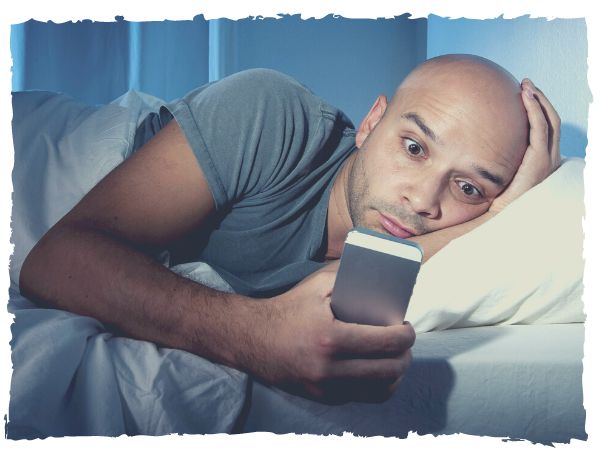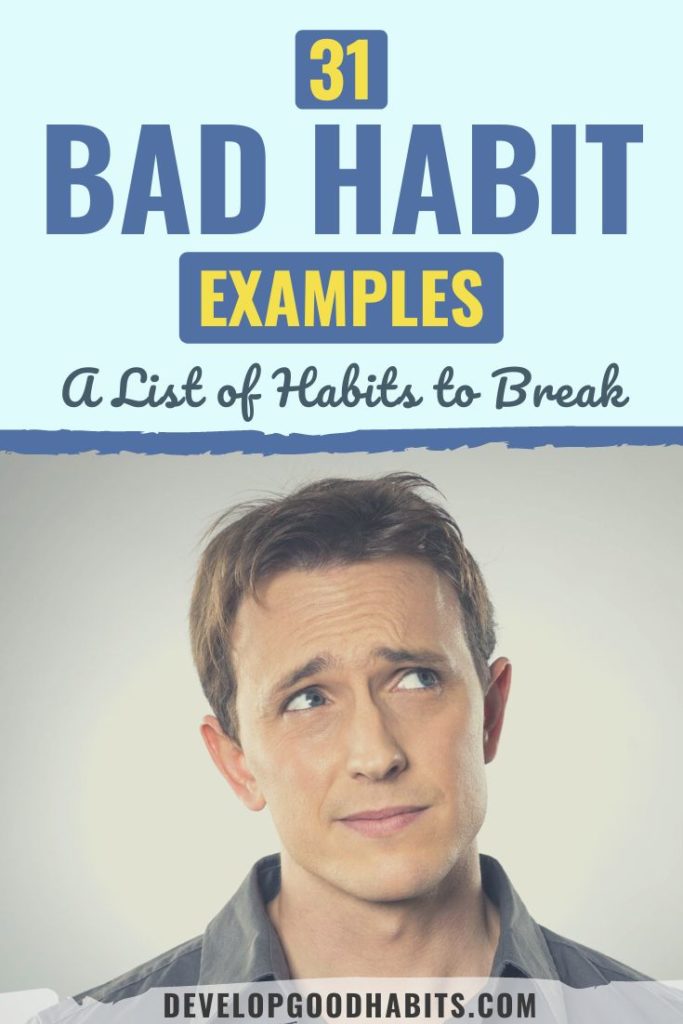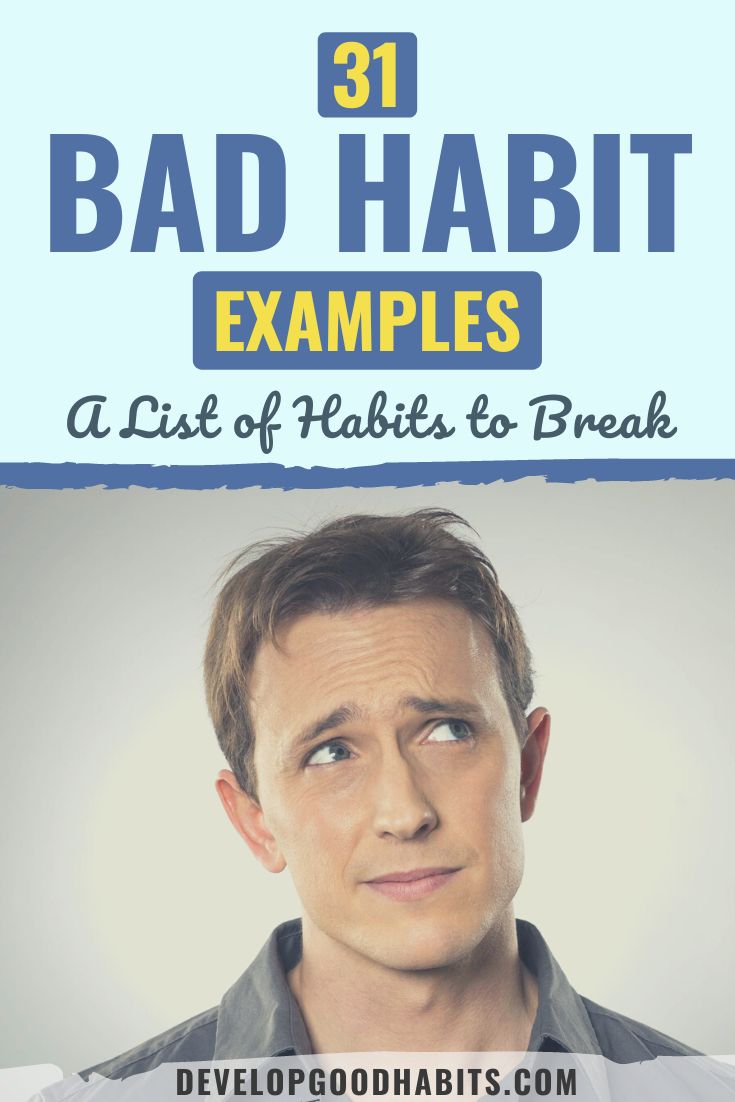
[ad_1]
There might be affiliate links on this page, which means we get a small commission of anything you buy. As an Amazon Associate we earn from qualifying purchases. Please do your own research before making any online purchase.
2022 is quickly coming to a close and, like me, you might still be struggling to give up habits that aren’t necessarily good for you. So much for New Year’s Resolutions and the list of changes you were planning to make, right? Worry not. You still have time to get it right.
In fact, I’m happy you came across this article. At Developing Good Habits, we want to help you break habits that interfere with personal development and start new routines that make life easier to manage. We’ll kick things off with 31 bad habit examples to get rid of by year-end.
What’s a bad habit anyway and who decides it’s so? Self-improvement experts see bad habits as negative repetitive behaviors that get in the way of your overall enjoyment of life. They include those that adversely affect health, employment, and relationships, and break laws.
Then there are those that are socially frowned upon because they fly in the face of established customs or simply just annoy people. Even more are the habits that keep you from evolving into a better version of yourself.
31 Bad Habit Examples to Kick in 2022
There’s practically an endless list of habits I think you should consider getting rid of if you wish to live a healthier and more meaningful life. Granted, what’s “bad” for some people is fair game for others.
Take meat eating vs smoking. Meat contains beneficial nutrients even though vegans believe eating meat is a bad thing. There are absolutely no health benefits to smoking, yet an estimated 30.8 million US adults smoke. Not to mention, it’s a leading cause of lung cancer deaths.
Ultimately, you’ll get to decide whether these are bad practices and how to give them up.
Let’s now turn attention to the following 31 undesirable practices I think you should shelve. My picks are based on a general consensus that they are in fact bad habit examples. These behaviors aren’t that hard to break off. Just think of the benefits then muster up some willpower and you’re good to go. And guess what? At least 21-30 days is all that’s needed to cultivate new positive habits.
#1. Procrastination
Most of us delay tasks, according to Harvard Business Review. You might do this to avoid unpleasant or difficult tasks. Perhaps you’re thinking you should delay them and do the more pleasant tasks first. Eventually, those tasks never get done or are completed late.
Procrastination slows down production and can result in loss of financial deals and missed opportunities. Counteract the habit by creating a system to get uncomfortable tasks out of the way ASAP, right after very pressing matters. Think of it as a “delayed gratification” strategy.
#2. Perfectionism
If you can’t do it right, you’re not doing it at all? The all-or-nothing attitude is a reflection of perfectionism. No one and nothing is perfect. Fear of failure, fear of criticism, and competitiveness are among the reasons why some people become so-called “perfectionists.”

Like procrastination, wanting things to be flawless all the time can lead to a drop in performance and productivity. Goals may never get achieved and you end up feeling like a total failure. Set achievable goals, avoid procrastination, and reassure yourself that it’s okay to make mistakes.
Explore 7 Best Pomodoro Apps & Timers to Master Your Productivity in 2022.
#3. Showing up late
I can’t think of a boss or anyone else who enjoys it when people show up late. Why is that so? First off, tardiness conveys a lack of self-awareness on your part. Not to mention, it shows you’re not respectful of people’s time or employment rules regarding work hours.
Friends and loved ones might think it’s rude for you to frequently show up late, especially if you fail to give them a heads-up. Emergencies and other incidents do occur, but being late most of the time is a habit and you need to break it this year.
#4. Smoking
Quitting smoking should be at the top of your bad habit examples list. Your life depends on it. Inhaling nicotine from cigarette smoking is a “leading cancer killer in both men and women in the U.S,” according to the American Lung Association. Smoking tobacco also causes permanent tooth discoloration, gum infections, bad breath, and oral cancer.
An effective strategy is to replace smoking with new healthy routines, such as jogging or spending time with loved ones. A friend of mine ceased cold turkey and has been sober for 12 years and counting.
Nicotine patches and e-cigarettes are also effective for those looking to quit, according to the Centers for Disease Control and Prevention (CDC).
#5. Neglecting yourself
Self-neglect is one of the worst things you can do to yourself, especially if you pour your all into caring for others. Dismissing your own hygiene or needs can come from a built-in belief that you’re not important. Regardless of if it’s a learned behavior or someone expressed it to you, you have the right to self-care and self-love.
Unlearn the habit of overlooking your needs by questioning negative beliefs. Practice prioritizing self-care and nurturing yourself like you would others. If anything, it’s a great way to show yourself compassion.
#6. Not getting enough sleep
Sleeping is quite therapeutic for the mind and body, yet I can’t seem to figure out why so many people go to bed late. Not getting enough shut-eye leaves you feeling lethargic and irritable the next day. It’s difficult to concentrate and be fully productive at work.
Create a sleep schedule that gets you at least the recommended 6-9 hours of sleep for adults. You’ll be proud of yourself for developing a new habit of going to bed early once you realize how amazing you feel in the morning. Quality sleep is also shown to reduce stress, improve memory, boost energy and mood, and strengthen your immune system.
#7. Not brushing your teeth daily
A person’s oral hygiene, or lack thereof, says so much about them. I know life gets busy, but teeth and gum health has to be a priority. You’re supposed to brush at least two times a day, rinse with mouthwash, and floss. The oral routine protects against cavities, gingivitis, gum disease, and bad breath.
You don’t want mouth hygiene to spoil your chances of dating success, do you? Men and women are disgusted by foul breath. Not only that, but poor oral hygiene is linked to diseases such as diabetes, heart disease, and stroke.
#8. Eating unhealthy
You probably already know this already, but it doesn’t stop you from indulging in fast foods or greasy home cooked foods. What about drinking sugary beverages? That too. Most of us adults have heard from our doctor or someone else that eating bad fats, sugary foods, and too much sodium is bad for our health.

You can reduce the risk of high cholesterol, high blood pressure, diabetes, and heart disease by starting a new, healthy diet. Train your brain to despise junk food with these healthy meals and snack ideas. Remove foods that trigger junk food cravings and replace sodas with water.
#9. Retail therapy
There’s nothing else that soothes away stress and eases my mind like showing up at my favorite home store. I usually end up leaving with hundreds of dollars in goods I don’t need. If you, too, can’t control the impulse to buy unnecessary stuff, don’t feel bad. That’s how you and I cope.
However, it’s an expensive form of emotional therapy that leads to huge debts and hoarding. Counteract retail shopping by reading a book, meditating, or going for a walk. These are all healthy alternative ways to fight the stress, anxiety, or depressive feelings that trigger wild purchases.
#10. Emotional eating
Another skeleton in my closet is emotional eating. Together we can kick the habit to the sun by identifying what triggers the craving for food. According to science, emotional eating stems from stress, grief, loneliness, and anxiety. Overeating, guilt, weight gain, and lowered self-esteem are the potential consequences.
Let’s fight this vice before it becomes an eating disorder by distracting ourselves with constructive activities. They can include distancing ourselves from unhealthy foods, drinking water, or talking with a trusted friend to help ease distress.
#11. Substance use
Drinking alcohol or using drugs may seem to be the only way to numb out pain or deal with emotional distress. They only provided a temporary fix to the problem, which might persist long after the euphoria is gone. Here’s your chance to cease substance use before it leads to addiction.
Addictive behaviors are more difficult to end since they affect your ability to make rational decisions. Loss of employment, money, or housing, and broken relationships can be avoided if you could simply quit while you’re ahead.
#12. Overthinking things
It’s so easy to think too much or over analyze things, especially if you’re a perfectionist or prone to worrying. You find yourself doubting decisions, goals, and even your own self. You’ll court anxiety second-guessing your decisions and worrying about work or relationship matters that are out of your control.
Trust that you’ve done all you can and let the rest unfold. Practice challenging negative thoughts and focusing on finding solutions to break the habit. Make use of mindfulness practices to snap yourself out of negative thinking loops.
#13. Dwelling on the past
Let’s face it, we can’t change the past no matter how much we think things over. We ruminate or dwell on the past to gain more insight, but it’s different from reflecting to improve our behavior in the future. Trouble comes when replaying past events starts making you feel anxious, worried, fearful, or depressed.
Fortunately, you can develop the habit of refusing to give in to the impulse to ruminate each time it happens. Distract yourself with more pleasant thoughts or engage in a brain activity that requires focus, such as solitaire. Accepting the past for what it is is another way to break the pattern.
#14. Letting people make decisions for you
Independent decision-making is one of the benefits of being an adult. People might think you lack the ability to stand on your own two feet when you let others decide for you. The problem with this modus operandi is that you’ll be living a life based on other people’s choices and value systems.
The decisions and outcomes may not align with your beliefs, standards, goals, or personal needs. You’re the best person to determine what’s best for you. Don’t allow people to take advantage of you by letting them make choices that can lead you astray.
#15. Watching too much TV
Almost a century after the world’s first electronic television was invented, watching TV remains one of the most common forms of self-entertainment. Nothing is wrong with that. It’s being glued to the TV for a long time (binge-watching) that’s the problem.
Daily and excessive TV screen time in one sitting have been linked to problems such as over-snacking, weight gain, and sleep deprivation. Cognitive decline and an increased risk of heart issues from inactivity are some of the other downsides.
Watch TV for less than two hours a day and ride a stationary exercise bike while you’re at it!
Going to bed late has become a norm in the age of technology and social media. Even when you’re in bed, you’re scrolling through Facebook, Instagram, Twitter, and Tik Tok one last time before you get some shut-eye.

The habit of frequently checking social media for LIKES, memes, and celebrity gossip can quickly become an addiction that impacts sleep, work, and relationships. Even if it’s your downtime, you could spend it doing constructive things, such as journaling or preparing healthy meals for the next day.
#17. Skipping lunch breaks
How does it benefit you to skip lunch? Generally, employers don’t pay you to take a lunch break. Even if that were the case, the habit of skipping your mealtime can eventually affect your health. Perhaps you’re seeking admiration or promotion, and think you need to impress your boss with workaholic tactics.
Always remember that you are not indispensable. Eating your meals on time is a show of self-care. Taking breaks also allows you to move away from the stressful work environment to reset and return energized and focused.
#18. Not exercising or staying active
Things like binge-watching TV, lengthy video-gaming sessions, doing a sit-down job, and lounging around are bound to affect your health in some way or another. Now you don’t necessarily have to run a mile or exercise 2-3 hours a day to stay active, healthy, and fit.
Get up and walk around your office building or neighborhood at intervals. Do some gardening, clean the house, walk, bike, or swim. You’re not only dismantling an unhealthy routine, you’re also investing in your physical and mental health.
#19. Chewing gum
I read an online article that dubbed gum chewing as a “vile” habit that enrages people who despise hearing the sound of people eating. But anyway, habitually chewing gum for whatever reason isn’t the best practice.
There are really no plausible health benefits of chewing gum. You’re more likely to experience frequent cheek bites, sore jaw muscles, cavities, and temporomandibular joint disorder (TMJ).
If chewing gum is how you freshen your breath, consider boosting your oral hygiene routine and seeing your dentist regularly. Drink water instead if you’re on a diet and chew bubble gum to abstain from food.
#20. Picking your nose in public
Picking away at your nostrils in public or not isn’t attractive at all. There’s a broad assumption that you’re picking boogers. What else could it be? Let’s not talk about the eating part. Even if it’s nose hair, there’s something about the habit that absolutely grosses people out.
Not only is it a dirty habit, but it’s also not healthy… and yet so many adults still do it. Regularly! They hypocritically scold their children for doing so, yet when they don’t think anyone is looking, the mining begins!
Whether you care what people think or not, it’s really not good for you. Sticking your fingers up your nasal cavity to clear out dried mucus pushes bacteria into your nostrils. This increases your risk of spreading flu viruses, nose bleeds, sores, and septum damage, among other things… making this one habit you need to kick to the curb—today.
#21. Saying yes to everything
You like to be in everyone’s good graces. I get it. It makes you feel nice, but what about the physical, emotional and psychological costs of being a people-pleaser? Commit to ending that tendency by practicing saying “No.”
If you think always saying, “Yes,” is gratifying, wait until you realize how empowering it is to let people handle their own problems. You’ll regain your sense of self, avoid caregiver burnout, and have more time to do you.
Prioritizing your needs is an act of self-love and will reduce any resentment you feel towards those you had trouble turning down. If you need help standing strong, check out our article on How to Say No without being Rude.
#22. Focusing on the trivial
Don’t waste time and effort on trivial matters. You’ll just work yourself up and lose focus on more important matters. You’ll cheat yourself out of the valuable time you could redirect toward achieving your goals and enjoying quality time with loved ones.
Focus on the things that will create a bigger impact or maximize performance. In business, the approach is called the 80/20 rule. 80% of results will come from just 20% of the action. In terms of behavioral changes, develop a habit of gratitude for what you have, and don’t sweat the small stuff. Studies reveal that giving thanks can make you happier.
See 283 Things to be Thankful For in Life.
#23. Not setting goals
Living life without goals is like being in a boat without a sail. When you go about your day, whether it’s at work or home, do you feel a lack of sense of purpose? Do you feel empty or lost?

Your job may have established work goals, but you need to get into the habit of setting personal short-term and long-term goals. For example, buying a home, losing weight, traveling, or changing negative behaviors.
When setting goals, whether personal or professional, it is always a smart move to select goals that are Specific, Measurable, Attainable, Relevant, and Time-bound (SMART). You’ll reduce frustration and boost your chances of success by taking this approach.
#24. Not learning new things
Never tell yourself you’re too old to learn anything new. Better yet, don’t convince yourself that you know everything. Arrogance is the definition of such an attitude and not too many people enjoy interacting with know-it-alls.
Snap out of that mindset and make a commitment to continue building your knowledge base. You can start by reading books and expert articles related to areas you struggle with… e.g., communication skills, coping with adversity, or establishing healthy relationships. Life should become easier to navigate once you start applying what you’ve learned.
Need some inspiration? Check out our article with over 100 new skills to learn in 2022.
#25. Not reflecting enough on life
Reflecting, not dwelling, on things done and said is a healthy habit to pursue. This new habit is a foundation for growth in various areas of life. When you don’t stop to retrace your steps or examine your thoughts and actions, you’re more prone to repeating mistakes.
Reflecting in your quiet moments enables you to come up with solutions to challenges you hadn’t thought of in the height of things. You’ll learn more about yourself and your purpose. There will be opportunities to make lifestyle adjustments that help you align with your true purpose and experience greater success.
#26. Not having daily routines
There are multiple physical and psychological benefits to creating a daily routine. For one, it helps to get your day started on the right track and keep you organized. Write down the most important things that need to get done throughout the day. You can even break them into the morning, afternoon, and evening segments to stay organized.
A sleep, exercise, spirituality, and family time routine should feature on your to-do list. Don’t forget to add “empty email inbox daily” as emails pile up fast! Routines relieve anxiety and help you maximize every minute of your day. Wait until you realize how much set routines give life more meaning.
#27.Lashing out at people
Just like suffering in silence isn’t a healthy way to deal with distress, so is taking it out on everyone who crosses your path. Stress from the daily grind and close relationships eventually takes a toll. You can’t get away from it, but you can learn how to control your emotions and stop misdirecting your anger and resentment.
Ask yourself why you’re so angry and what events trigger the emotion. Train yourself to remain silent whenever you recognize the signs and feel that urge to explode. Some say counting from one to 10 (or higher) is a healthy way to diffuse and manage your feelings.
#28. Staying with a toxic partner
Who would have thought that you keep fighting (perhaps literally) to make an unhealthy relationship work simply because you can’t help it? It’s a habit if you have a pattern of holding onto broken relationships. A relationship that’s riddled with drama, disrespect, and trust issues is not easy to restore.
That’s more the case if your partner is struggling with disruptive behaviors due to borderline personality disorder or narcissism. You’re better off cutting your losses to maintain your dignity and sanity. Make it a practice to single out more suitable partners instead of those that aren’t emotionally stable to build a loving relationship.
#29. Biting down on hard objects
Biting your nails, pens, pencils, or ice is a bad habit that is discouraged by dentists. You may not have realized the habit until now, since many people do it without thinking. The practice is often done to relieve stress or anxiety, but some people nibble the back of a pen or pencil while brainstorming for ideas.
Developing self-awareness and finding healthy ways to manage stress are helpful strategies to combat this tendency. What’s more, is that you may avoid damaging your teeth and save money on expensive dental restoration.
#30. Texting and driving
Another car almost crashed into mine head-on the other day, all because of a third driver who was most likely distracted. I wouldn’t be surprised if driving while texting was the reason. Thousands of people died and hundreds of thousands were injured in 2020 due to distracted driving.
Many states like New York and Georgia have introduced hands-free laws to curb the number of related accidents. Remind yourself that your safety is far more important than responding to a text or call that can certainly wait. Practicing letting calls and messages go unanswered until you are safely parked can save lives.
#31. Ignoring loved ones
We all have bad days and don’t feel like communicating or socializing. That doesn’t make it okay to go mute or disregard and dismiss friends or loved ones. You still have a duty to respond to certain needs of your partner or children. Not only is it rude, but you’re also demonstrating a lack of empathy and trouble self-regulating.
Shutting down, withdrawing, and giving the “silent treatment” are passive-aggressive ways to cope with challenges. Improve your mood by journaling your thoughts, exercising, or taking a quick nap. That way, you can stay emotionally connected and reduce friction in personal relationships.
Final Thoughts on Bad Habits to Break in 2022
Bad habits are a lot like an addiction. They are often easy to pick up, yet never easy to break free from. Whether it’s a food, drug, sex or alcohol-related addiction… it requires determination and willpower on your part, along with a support system and sometimes outside help, to preserve. Habits aren’t much different.
Sure, one might argue that most bad habits won’t kill you… but I would disagree. Bad habits are the start of what often spawns a chain reaction towards self destruction, or worse. Take our last example, for instance, “ignoring your loved ones”.
While this act in itself may not hurt you in the short-term, what happens when the dad you’ve been holding a grudge towards for years dies suddenly… leaving you second-guessing your decision to “ice” him? Now you’re depressed and wracked with feelings of guilt.
This eventually affects your work and your personal life, and will likely result in your pushing people away and having to seek counseling. Maybe even be put on antidepressants. And over what? A bad habit you had a choice of breaking, but let your pride and stubbornness prevent you from doing so.
Don’t let other people’s shortcomings become your own. And don’t be a sheep and follow the crowd in order to fit in. Every day, you wake up with the power to choose a path for yourself that leads somewhere positive… a place where the sky’s the limit.
Find your motivation, your “why”, for wanting to be the best version of yourself possible. Once you do, hold onto that. Picture what could be and, before long, you’ll have no trouble replacing your bad habits with good ones.


[ad_2]